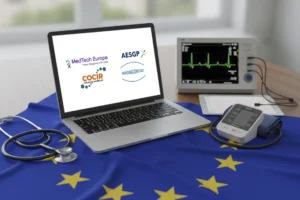Team-NB, the European Association for Medical Devices of Notified Bodies, has released an updated position paper addressing the implementation and application of the EU Artificial Intelligence Act (AI Act), with particular focus on how it intersects with existing medical device regulations – the Medical Device Regulation (MDR) and In Vitro Diagnostic Regulation (IVDR).
The position paper highlights concerns about potential regulatory overlap and provides recommendations for a more streamlined approach to ensure medical device manufacturers don’t face duplicative compliance requirements.
Background
- The EU AI Act (Regulation (EU) 2024/1689) came into force on August 1, 2024, and introduces a risk-based regulatory framework for AI systems across all sectors, including medical devices.
- High-risk provisions of the AI Act, which are especially relevant for medical devices and IVDs incorporating AI, will apply from August 2, 2027
Key points from Team-NB’s updated position include:
1. Urgency and Coordination in Designating Notified Bodies (NBs)
- Team-NB stresses the need for a coordinated approach among EU Member States to designate and oversee NBs for AI systems.
- Delays in national implementation could lead to a shortage of designated NBs, risking bottlenecks when the high-risk provisions become mandatory in 2027
- Existing MDR/IVDR NBs cannot automatically extend their scope to the AI Act; a separate, notification process is needed, as outlined in Article 31 of the AI Act
2. Leveraging Existing Frameworks
- Team-NB advocates for using the current MDR/IVDR frameworks and enhancing NB competencies to cover AI requirements, rather than creating entirely new processes
- This would involve adding AI-specific codes to NB scopes, streamlining conformity assessments for medical devices with AI components
3. Regulatory and Administrative Challenges
- The paper highlights legal and administrative hurdles, including the need for clear definitions (e.g., “AI system,” “safety component,” “substantial modification”) to avoid inconsistent interpretations and market disruptions
- There are concerns that not all Member States will be ready to implement laws and designated authorities by August 2025, potentially causing compliance delays
4. Conformity Assessment and Data Governance
- Notified Bodies will play a central role in conformity assessment, requiring GDPR-compliant access to manufacturers’ datasets and, where necessary, independent datasets for testing AI in medical devices.
- The AI Act emphasises protecting fundamental rights (privacy, data protection, non-discrimination, human dignity), which must be integrated into manufacturers’ risk assessments and technical documentation.
5. Standardisation and Reporting
- Delays in harmonised standards for AI could complicate conformity assessments, forcing reliance on state-of-the-art comparisons.
- Integration of AI Act reporting requirements with existing MDR/IVDR systems is necessary to avoid duplication and ensure comprehensive oversight.
Implications for Stakeholders
- Manufacturers of AI-enabled medical devices should proactively engage with their NBs to understand new compliance requirements and prepare for the transition.
- Notified Bodies must invest in training and resources to build AI expertise and meet the stringent requirements of the AI Act
- Regulators and policymakers must provide clear guidance and harmonise implementation to prevent market fragmentation and delays in access to innovative medical technologies.
In Summary
Team-NB emphasises that proper implementation is crucial to avoid slowing innovation in medical AI technologies while maintaining patient safety standards. Medical device manufacturers are advised to closely monitor these regulatory developments as the AI Act moves toward full implementation.
Need expert guidance on medical device regulations? Contact MedQAIR today





